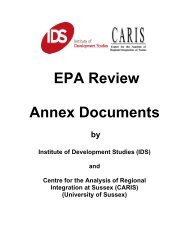The Impact of Energy Use on Poor Urban Livelihoods in ... - DfID
The Impact of Energy Use on Poor Urban Livelihoods in ... - DfID
The Impact of Energy Use on Poor Urban Livelihoods in ... - DfID
You also want an ePaper? Increase the reach of your titles
YUMPU automatically turns print PDFs into web optimized ePapers that Google loves.
APPENDIX D8<br />
PRESS CONFERENCE<br />
A Study <str<strong>on</strong>g>of</str<strong>on</strong>g> the <str<strong>on</strong>g>Impact</str<strong>on</strong>g> <str<strong>on</strong>g>of</str<strong>on</strong>g> <str<strong>on</strong>g>Energy</str<strong>on</strong>g> <strong>on</strong> <strong>Poor</strong> <strong>Urban</strong> <strong>Livelihoods</strong> <strong>in</strong> Arusha, Tanzania<br />
PRESS RELEASE<br />
Tuesday 17 February 2004<br />
<str<strong>on</strong>g>The</str<strong>on</strong>g> press c<strong>on</strong>ference began with the follow<strong>in</strong>g statement by Sheilah Meikle<br />
INTRODUCTION<br />
• Good morn<strong>in</strong>g ladies and gentlemen<br />
• My name is Dr Sheilah Meikle from L<strong>on</strong>d<strong>on</strong> University (www.ucl.ac.uk/dpu)<br />
• <str<strong>on</strong>g>The</str<strong>on</strong>g>se are my colleagues from CDTI Tengeru and this is Mr Selenge - pr<strong>on</strong>cipal <str<strong>on</strong>g>of</str<strong>on</strong>g> CDTI and<br />
Patrice North, my colleague from L<strong>on</strong>d<strong>on</strong><br />
• We are also work<strong>in</strong>g with a local NGO, WODSTA (Women's Development for Science and<br />
Technology)<br />
<str<strong>on</strong>g>The</str<strong>on</strong>g> nature <str<strong>on</strong>g>of</str<strong>on</strong>g> the study<br />
• Currently we are work<strong>in</strong>g together <strong>on</strong> a poverty and energy research study and that is why I am<br />
meet<strong>in</strong>g you this morn<strong>in</strong>g.<br />
• <str<strong>on</strong>g>The</str<strong>on</strong>g> study is funded by the UK's Department for Internati<strong>on</strong>al Development (DFID)<br />
• <str<strong>on</strong>g>The</str<strong>on</strong>g> field work has been undertaken <strong>in</strong> two wards <strong>in</strong> Arusha - Daraja Mbeli and Kaloleni<br />
<str<strong>on</strong>g>The</str<strong>on</strong>g> workshops<br />
• We are hold<strong>in</strong>g two workshops this week <strong>in</strong> the communities<br />
• <str<strong>on</strong>g>The</str<strong>on</strong>g> purposes <str<strong>on</strong>g>of</str<strong>on</strong>g> the workshops are:<br />
- to discuss the prelim<strong>in</strong>ary f<strong>in</strong>d<strong>in</strong>gs from the research; and<br />
- discuss and explore local energy <strong>in</strong>terventi<strong>on</strong>s which could address some <str<strong>on</strong>g>of</str<strong>on</strong>g> the<br />
energy related problems that have been identified<br />
HIGHLIGHTS OF FINDINGS<br />
Some <str<strong>on</strong>g>of</str<strong>on</strong>g> the f<strong>in</strong>d<strong>in</strong>gs we have identified are already <strong>in</strong> the public doma<strong>in</strong><br />
• Fuels<br />
- <str<strong>on</strong>g>The</str<strong>on</strong>g>se communites have a high dependence <strong>on</strong> Charcoal and firewood. This is<br />
problematic because <str<strong>on</strong>g>of</str<strong>on</strong>g> supply issues<br />
- Communities preference for electricity is also problematic because:<br />
- it is unaffordable by poorer memebrs <str<strong>on</strong>g>of</str<strong>on</strong>g> the community (witness disc<strong>on</strong>necti<strong>on</strong>s<br />
and lack <str<strong>on</strong>g>of</str<strong>on</strong>g> c<strong>on</strong>necti<strong>on</strong>s)<br />
- where the better-<str<strong>on</strong>g>of</str<strong>on</strong>g>f can afford some electricity they still have preference for<br />
us<strong>in</strong>g other fuels for cook<strong>in</strong>g<br />
- Kerosene is popular but expensive and therefore less available to poorer<br />
members <str<strong>on</strong>g>of</str<strong>on</strong>g> the community<br />
- Very limited use <str<strong>on</strong>g>of</str<strong>on</strong>g> other types <str<strong>on</strong>g>of</str<strong>on</strong>g> fuel e.g. lpg, solar or biogas<br />
<str<strong>on</strong>g>Energy</str<strong>on</strong>g> decisi<strong>on</strong>s<br />
• <str<strong>on</strong>g>Use</str<strong>on</strong>g> <str<strong>on</strong>g>of</str<strong>on</strong>g> energy impacts more <strong>on</strong> time and life <str<strong>on</strong>g>of</str<strong>on</strong>g> woemen and girls compared with men, e.g.<br />
cvollect<strong>in</strong>g and us<strong>in</strong>g fuel<br />
• However most <str<strong>on</strong>g>of</str<strong>on</strong>g> the decisi<strong>on</strong>s around energy are made by men, e.g. <strong>in</strong> relati<strong>on</strong> to the type <str<strong>on</strong>g>of</str<strong>on</strong>g><br />
energy used and the stoves and appliances purchased.<br />
• This is unfortunate because men tend to be c<strong>on</strong>servative about energy descisi<strong>on</strong>s especially <strong>in</strong><br />
poor households.<br />
Development Plann<strong>in</strong>g Unit, UCL L<strong>on</strong>d<strong>on</strong><br />
Dr. Sheilah Meikle and Patrice North
















